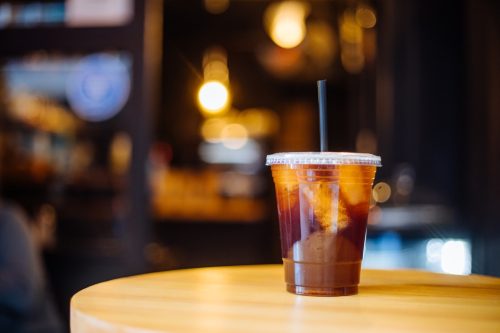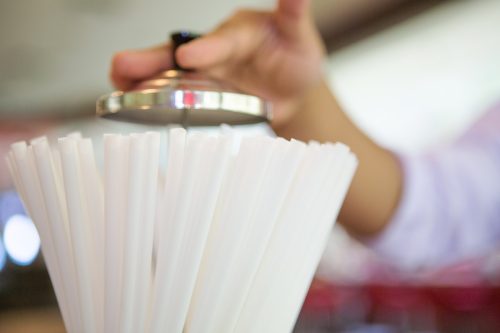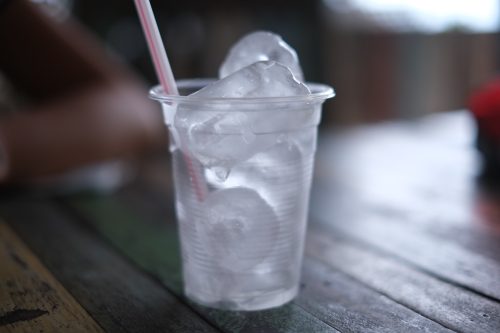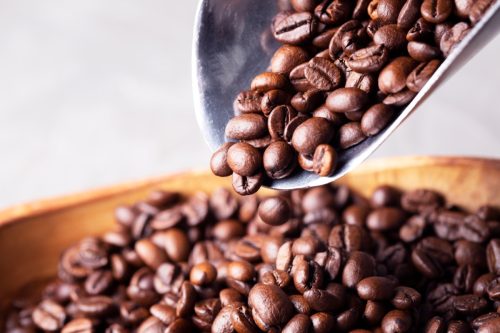If You Drink Iced Coffee, Prepare for This Major Shortage, Experts Warn

Despite the colder months rolling in, many of us still plan to have our iced coffee in hand while we brave the chilly weather. Iced coffee has become one of the most popular ways to get a caffeine fix, with around 20 percent of U.S. coffee consumers drinking iced coffee at least once a week, according to Bean & Bean Coffee Roasters. But iced coffee lovers might have problems securing their go-to drink soon, as major shortages are set to impact stores across the country. Read on to find out how your iced coffee order might soon be affected.
RELATED: Kroger Just Said Shoppers Are Barred From Doing This in Stores.
Experts are warning about a shortage of iced coffee cups.

Many restaurants are facing new challenges amid ongoing global supply chain issues, CNBC reported on Nov. 6. According to the news outlet, iced coffee cups are one of the latest items experiencing a shortage right now.
“There’s … very, very few clear, iced coffee drink cups,” David Pokorny, a food packaging expert for Imperial Dade, a company that sources products for major food businesses, told CNBC. Pokorny said he spends most of his day trying to find enough products for all of his customers.
In September, Mocha Jo’s Coffee Company in Arkansas reported similar issues. Maegan Broadway, the coffee company’s owner, told local affiliate station KAIT 8 that ordering cups from vendors has been especially complicated recently.
“They would say they have it in stock, we’ll order it, pay for the order, and then we’ll get an out-of-stock notification,” Broadway said, adding that plastic cup vendors are also asking for almost triple their normal price for cups.
RELATED: Alaska Airlines Is Removing This From Flights, Starting Tomorrow.
Plastic straws are also in short supply right now.

But that’s not the only shortage that could affect your iced coffee right now. Plastic straws are also in short supply—if they’re available at all. “There’s literally no straws,” Pokorny told CNBC.
Gary Bowen, owner of the Honey Dew shops in Cumberland and Front Street, Rhode Island, told The Valley Breeze in late October that his coffee shops have had a hard time securing products as well, meaning that he has had to work with whatever he can get.
Currently, he said he has been using large paper straws with iced drinks instead of plastic straws because that’s all that has been available from suppliers. “We really take what they give us,” Bowen told the news outlet.
Production plants play a large part in these shortages.

The shortages affecting both plastic iced coffee cups and plastic straws can be attributed to the major ice storm that hit Texas in February, CNBC reported. As a result of the storm, petrochemical plants in Texas had to be shut down, which helped to set off a shortage of plastic products. Petrochemicals are a key component in making plastic straws and iced coffee cups.
The Wall Street Journal also reported in March that two widely used plastics, polyethylene and polypropylene, had their highest increase in prices in an entire decade. This was also brought on by the February storm, which caused the production of resin, another key component in plastic, to drop by 25 percent, Perc Pineda, chief economist for the Plastics Industry Association, wrote in a June statement.
“There was such a shortage that people said, ‘I don’t care about the price, just send it to me,'” Pokorny told CNBC.
RELATED: For more retail news delivered straight to your inbox, sign up for our daily newsletter.
Coffee itself is also facing a shortage.

Unfortunately, it’s not just the products you might need to drink your iced coffee that are in trouble right now. According to experts, coffee beans are in short supply this year, largely brought on by a drought in Brazil, the third largest producer of arabica coffee beans, per Reuters. But that’s not the only problem impacting coffee production at the moment.
“Coming into this year (2021) it was an ‘off season’ year, where the coffee trees don’t produce as much as they would in an ‘on season’ year,” Phil Flynn, a senior market analyst of Price Futures Group, told Fox 32 Chicago. “That’s part of the problem. Then you exasperated the problem because you had a drought in Brazil.”
As a result, coffee prices are going up, too. According to Vox, the price of arabica beans alone this year is already up by 43 percent. “A lot of these issues you can’t fix overnight. You can’t make coffee trees produce any faster. You can’t make them bounce back,” Flynn told Fox 32 Chicago. “It may take a couple of years for things to get back to normal.”
RELATED: If You Drink Your Coffee Like This, You May Be Increasing Your Cancer Risk, Study Says.